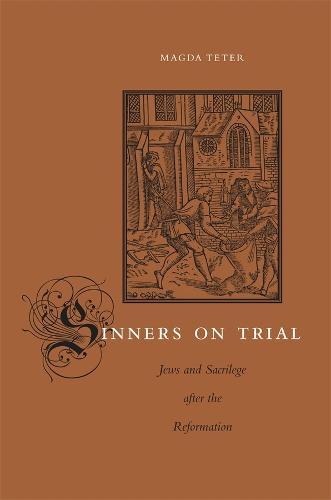Awards
- Commended for Jordan Schnitzer Book Award 2014
- Nominated for Kulczycki Book Prize in Polish Studies 2012
- Nominated for Reginald Zelnik Book Prize in History 2012
- Nominated for Roland H. Bainton Book Prize 2012
Overview
In post-Reformation Poland-the largest state in Europe and home to the largest Jewish population in the world-the Catholic Church suffered profound anxiety about its power after the Protestant threat. Magda Teter reveals how criminal law became a key tool in the manipulation of the meaning of the sacred and in the effort to legitimize Church authority. The mishandling of sacred symbols was transformed from a sin that could be absolved into a crime that resulted in harsh sentences of mutilation, hanging, decapitation, and, principally, burning at the stake. Teter casts new light on the most infamous type of sacrilege, the accusation against Jews for desecrating the eucharistic wafer. These sacrilege trials were part of a broader struggle over the meaning of the sacred and of sacred space at a time of religious and political uncertainty, with the eucharist at its center. But host desecration-defined in the law as sacrilege-went beyond anti-Jewish hatred to reflect Catholic-Protestant conflict, changing conditions of ecclesiastic authority and jurisdiction, and competition in the economic marketplace. Recounting dramatic stories of torture, trial, and punishment, this is the first book to consider the sacrilege accusations of the early modern period within the broader context of politics and common crime. Teter draws on previously unexamined trial records to bring out the real-life relationships among Catholics, Jews, and Protestants and challenges the commonly held view that following the Reformation, Poland was a ""state without stakes""-uniquely a country without religious persecution.
Full Product Details
Author: Magda Teter
Publisher: Harvard University Press
Imprint: Harvard University Press
Dimensions:
Width: 15.60cm
, Height: 3.00cm
, Length: 23.50cm
Weight: 0.671kg
ISBN: 9780674052970
ISBN 10: 0674052978
Pages: 358
Publication Date: 01 May 2011
Audience:
Professional and scholarly
,
General/trade
,
Professional & Vocational
,
General
Format: Hardback
Publisher's Status: Active
Availability: Out of stock

The supplier is temporarily out of stock of this item. It will be ordered for you on backorder and shipped when it becomes available.
Reviews
Photo by Shawn Hill Superb...Teter opens her study with a general introduction to the hierarchical conceptions of the sacred in Catholicism, making clear that at the summit of the hierarchy is the consecrated communion wafer. This is followed by a chapter on the history of church thefts in early modern Poland--the main geographical setting of her book. In these crimes, Jews often served as pawns for the sale of stolen communion vessels, chalices, candelabra, paintings, and other precious sacred objects. A remarkably gifted story-teller, Teter relates about a dozen such crimes and their grim consequences...In her captivating narrative, Teter has painstakingly documented how the body politic and the body of Christ were inextricably bound together through the early modern period, and how the Reformation not only failed to diminish the host-desecration calumny but, at least in Catholic Poland, gave it new energy. -- Allan Nadler Jewish Ideas Daily 20110509
Photo by Shawn Hill
Photo by Shawn Hill Superb...Teter opens her study with a general introduction to the hierarchical conceptions of the sacred in Catholicism, making clear that at the summit of the hierarchy is the consecrated communion wafer. This is followed by a chapter on the history of church thefts in early modern Poland--the main geographical setting of her book. In these crimes, Jews often served as pawns for the sale of stolen communion vessels, chalices, candelabra, paintings, and other precious sacred objects. A remarkably gifted story-teller, Teter relates about a dozen such crimes and their grim consequences...In her captivating narrative, Teter has painstakingly documented how the body politic and the body of Christ were inextricably bound together through the early modern period, and how the Reformation not only failed to diminish the host-desecration calumny but, at least in Catholic Poland, gave it new energy. -- Allan Nadler Jewish Ideas Daily 20110509 If Teter is not the first to take research in this direction, she has considerably advanced the argument by retelling the tale of Polish host desecration accusations with a graceful narrative and rich new detail. -- Glenn Dynner Jewish Review of Books 20120101
Author Information
Magda Teter is Professor of History and Shvidler Chair in Judaic Studies at Fordham University. The author of Sinners on Trial: Jews and Sacrilege after the Reformation (Harvard) and Jews and Heretics in Catholic Poland, she has received fellowships from the John Simon Guggenheim and Harry Frank Guggenheim foundations and was Mellon Foundation Fellow at the Cullman Center, New York Public Library.



